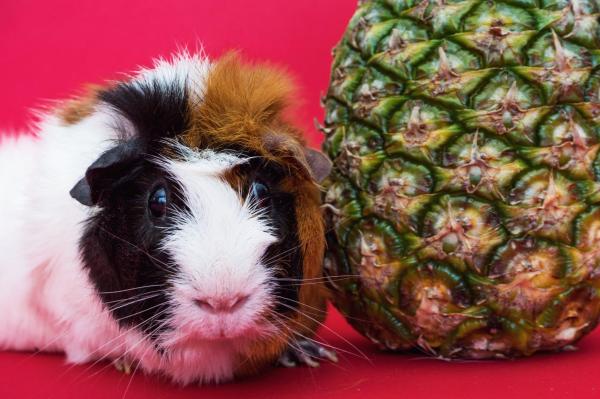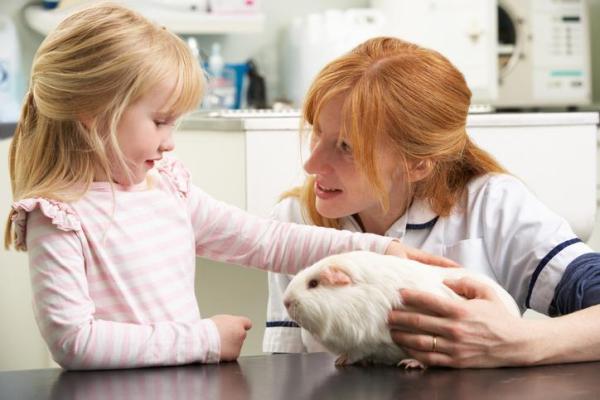
Diarrhea in guinea pigs is a relatively frequent disorder and does not usually result from serious harm to the animal. However, if the diarrhea is prolonged, chronic or particularly intense, it can threaten the animal's well-being. A veterinary emergency will occur of the guinea pig is severely dehydrated.
In this AnimalWised article, we discuss why my guinea pig has diarrhea. By looking at the possible causes of guinea pig diarrhea, we can know how it may be treated as well as what we can do to prevent it occurring again in the future.
What is diarrhea in guinea pigs?
Guinea pigs have a very distinctive stool, although it bears a resemblance to rabbit feces. This animal produces torpedo-shaped pellets which are quite hard due to the large amounts of fiber they ingest from their diet. We can even see guinea pigs eating their stools. This is a common behavior which occurs because they can still gain nutrients from them.
For a guinea pig to have diarrhea, these once hard stools become liquid. They may be a mixture of solid and liquid, but healthy guinea pig stools should be solid only. Diarrhea is a symptom of a disease, but not a disease in itself. It can be idiopathic, i.e. of unknown origin, but we can look at any concurrent symptoms to determine the cause.
As we stated in the introduction, small amounts of guinea pig diarrhea do not necessarily present a problem. However, if the loose stools continue and we see they exhibit other symptoms, we should take them to a veterinarian. This is especially the case if we see them start to become lethargic, they stop eating or even become unresponsive.
The importance of guinea pig diet
Diarrhea is a symptom of a gastrointestinal problem. This means poor diet is a common cause of diarrhea in guinea pigs. Guinea pigs need a significant supply of fiber to regulate their intestinal transit. It also helps to wear their teeth down and maintain proper dentition. Preventing gastrointestinal problems in guinea pigs is very important, so the following basic dietary standards need to be met:
- About 75% of their diet should be made of good quality guinea pig-specific hay.
- About 20% should be dry feed for guinea pigs.
- 5% will be vegetables rich in vitamin C, such as endive, cabbage or spinach. This vitamin is very important because guinea pigs cannot synthesize it naturally and its deficiency is responsible for the disease scurvy.
- Fruits and vegetables can be given occasionally as a treat.
- In some cases it may be necessary to use vitamin C supplements. Our veterinarian will determine if this is required.
We should also note that the dietary needs of our guinea pig will vary according to individual circumstance. Age is a particularly important factor. Sometimes the food we offer our guinea pig is suitable for cavies (another word for guinea pigs), but they still have diarrhea. In these cases, sudden dietary changes can be at fault. Otherwise, if the guinea pig has the correct diet, the diarrhea could be due to ingesting something mildly toxic. For this reason, we need to be careful with foods toxic to guinea pigs and introduce any changes gradually.

Parasites
Another common cause of diarrhea in guinea pigs is intestinal parasites. To avoid the development of both internal and external parasites, it is important we deworm our guinea pig regularly. To do so, we must follow the instructions of our veterinarian. Not all vets have expertise in treating exotic animals, the category under which guinea pigs fall. For this reason, we may need to speak to an exotic pet specialist.
It is also important we only use the type of dewormer prescribed by the veterinarian. Do not use deworming agents for other animals as it can cause intoxication or overdose. Our veterinarian will know which parasites from which your guinea pig needs protection. Once the parasites have been killed, the vet will recommend which treatment is required for preventive deworming.
Scurvy
We mentioned the importance of vitamin C in a guinea pig's diet since they cannot synthesize it naturally themselves. The reason for this is because a deficiency of vitamin C results in a disease known as scurvy, a problem which is relatively common in cavies. This disease is characterized by skin lesions, pain when handling and diarrhea, among others. Treatment is usually vitamin C supplements as prescribed by a veterinarian after diagnosis.
Regarding vitamin C, it is important to know it can be easily degraded. This means adding it to the water of our guinea pig might mean it will be diluted and the animal won't have sufficient amounts. The same can happen with foods enriched with vitamin C as it can be lost during storage. For this reason, we need to ensure their diet is not only correct, but fresh when it needs to be and of a suitable quality. In this related article, we provide the fruits and vegetables which can benefit a guinea pig.
Bacterial infections
It is also possible that the explanation as to why our guinea pig has diarrhea is in the bacteria that can proliferate in its digestive system. As always, the vet will diagnose and treat accordingly. We must bear in mind that some bacteria can be transmissible, so we must take proper hygiene measures. This means washing our hands well after handling our guinea pig or its accessories, and separating animals which live together.
It is also important to keep the bed clean, remove feces and change their substrate as often as necessary. In these cases, the guinea pig may present other symptoms, in addition to diarrhea, so it is important that we go to the vet promptly to avoid serious complications such as dehydration.

Side effects of medication
Finally, sometimes the explanation for why our guinea pig has diarrhea is due to the side-effects of certain medication. Not every animal will react the same to a certain medication, so it is possible one will develop diarrhea where another one doesn't. If we see our guinea pig develop diarrhea after taking a certain medication, speak to your veterinarian who will likely prescribe a suitable alternative.
This article is purely informative. AnimalWised does not have the authority to prescribe any veterinary treatment or create a diagnosis. We invite you to take your pet to the veterinarian if they are suffering from any condition or pain.
If you want to read similar articles to My Guinea Pig Has Diarrhea, we recommend you visit our Other health problems category.